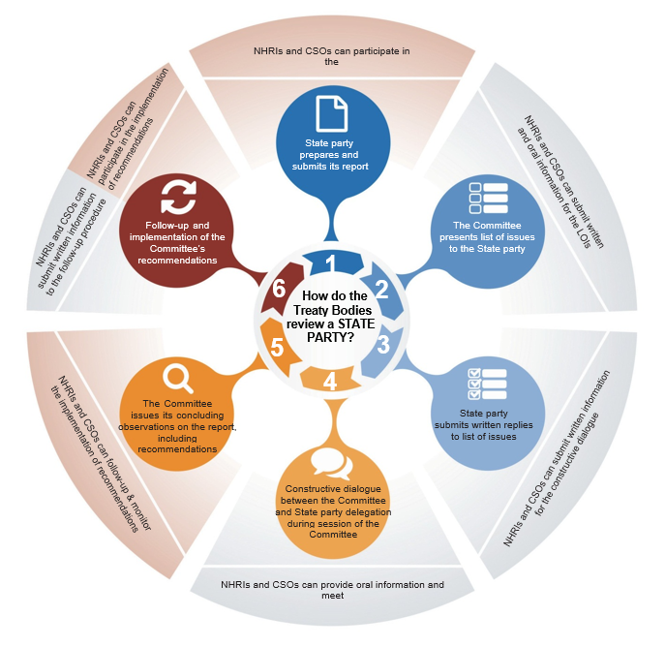This and the previous section provide information and tips on how you can input effectively into the review of your country.
It follows from the section on Periodic Reviews – Why are they useful?
There are several ways you can participate in the periodic review process – you can:
Section 3.5: Engage prior to the Treaty Body review
Section 3.6: Participate in the Treaty Body review and post review follow up
This section focuses on:

To view the Treaty Bodies Reporting Cycle with Stakeholders, click here
Source: Office of the High Commissioner for Human Rights (OHCHR)
During and after the review (Steps 4, 5, and 6 above)
You can participate in the review of your State by the Treaty Bodies by:
and:
Treaty Body sessions
Each Treaty Body normally meets two to three times per year. A Treaty Body session lasts approximately three weeks, but that depends on the Treaty Body and on the resources available.
Each Treaty Body session includes:
Examples of Treaty Body Programmes of Work
‘Public’ sessions are open to anyone who is registered with the OHCHR. NGOs can attend these sessions, observe, and speak during slots dedicated to interaction with civil society. These sessions are also available on the Treaty Bodies webcast. Remember that you don’t need an ECOSOC status to participate in those.
‘Private’ sessions are open to invitees only (NGOs can be invited to attend), and are not available through the webcast. Some Treaty Bodies only hold dialogues with national NGOs in private, non webcast sessions for security reasons.
‘Closed’ sessions are open to only the members of the Treaty Body, and are not available through the webcast.
To find Treaty Body Programmes of Work
Who can participate?
Anyone – individuals, groups, or representatives of an organisation – can attend a Treaty Body session. NGOs do not require ECOSOC accreditation to participate in Treaty Body sessions. Note however that some specific parts of the session programme are closed to the public (see below).
Information on how to register is normally provided on webpages or notes dedicated to civil society participation in the sessions. You can also contact the specialised NGO working closely with the particular Treaty Body. In some cases, only NGOs that have submitted a shadow report can attend those briefing, so check carefully the information note.

Remember! If you can foresee any risk related to your participation in the Treaty Body session, you should take precautionary measures such as liaising with international NGOs or other actors such as diplomats or UN representatives, who may be able to provide support in case this is needed. See also ISHR Academy: Security

Assa Traoré is a woman human rights defender and founder of ‘La Vérité pour Adama’. She has been campaigning for years for truth and justice for her brother, Adama Traoré – a Black French man killed in police custody in 2016. She has https://ishr.ch/latest-updates/france-authorities-urged-to-ensure-justice-for-adama-traore-and-end-judicial-harassment-of-human-rights-defender-assa-traore/faced judicial harassment for advocating for a transparent investigation to establish the responsibility of the gendarmes for the death of her brother and for them to be brought to justice. Through a shadow report, ISHR and Comité Adama aimed to draw the Committee’s attention to the issue of police violence, focusing on the case of Adama Traoré and the outcome of the investigation and the proceedings related to it. During the dialogue with France, the Committee said that it had received some worrying information about the excessive use of force by the police which had led to certain deaths, and that these concerns had been previously raised by the Human Rights Committee and the Committee on the Elimination of Racial Discrimination (CERD); both of which have raised concern about the excessive use of force during road checks, arrests and in the context of protests and that persons of African descent, of Arab origin, Indigenous Peoples and migrants are particularly affected by the excessive use of force by the police.
Through your alternative or shadow report submitted prior to the Treaty Body session, through any oral submissions made during the Treaty Body session, and by meeting and discussing issues with Treaty Body members informally, you can present information for consideration by Treaty Bodies in their concluding observations or recommendations.
It is recommended that you translate concluding observations into your national language especially when the national language(s) is not a UN official language. You may request support from UN agencies or the diplomatic community to translate the concluding observations of a Treaty Body.
For instance, ISHR has developed explainers on CESCR & CEDAW’s recommendations for China and Hong-Kong reviews, in an easy-to-read document and showcased side-events.
For additional information on how you can engage in follow up and implementation of Treaty Body concluding observations and recommendations post-review, see ISHR Academy: Following up with Treaty Bodies.